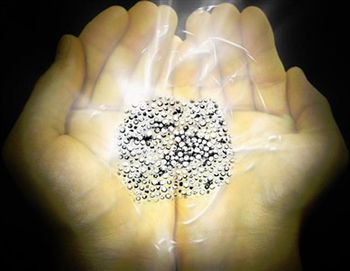
MagSi-proteomics beads are magnetic beads that are an ideal tool for the purification, concentration and desalting of peptides and protein digests. The surface of the beads has been modified with C4, C8 and C18-alkyl groups that are optimised for reversed phase applications.
Sample purity and throughput are areas of key importance for proteomics researchers. Magnetic beads offer a convenient solid support for a variety of assays and procedures based on affinity purification. They are especially well suited for automated procedures because instrumentation is available to easily mix, incubate and separate the magnetic beads in 96-well plates without columns or centrifugation. This ease-of-use enables rapid processing of many samples and seemless integration into automated workflows.
MagSi proteomics beads have been demonstrated as a powerful tool in desalting of proteomics samples after protein digestion and prior to mass spectrometry. Offering higher throughput and cost efficiency compared to tip-based separations - MagSi proteomics beads efficiently bind and elute even tiny sample fractions. Peptide amounts as low as 20 - 50 ng can be desalted by MagSi proteomics C8 and C18 beads and analyzed by state of the art MALDI-TOF instruments. Typically for small peptides MagSi-proteomics C8 or C18 beads are suited best, whereas MagSi proteomics C4 and the MagSi-WCX are optimised for larger proteins.
The high magnetic strength of MagSi beads makes them applicable for both, manual and automated/robotic fractionation, because the beads will typically collect in less than 1 minute when magnetic force is applied. This quick and complete separation gives very good reproducibility since no beads will be lost during washing steps. Furthermore the quick protein adsorption, desorption and magnetic collection typically shortens significantly the protocol time over conventional column based ion exchange chromatography.
